Challenges in International Business: Political, Legislative, Communication and Technology
VerifiedAdded on 2023/06/12
|5
|1109
|425
AI Summary
This article discusses the challenges faced by international businesses in Indonesia due to political, legislative, communication and technology issues. It highlights the flawed taxation system, weak government, and lack of adequate knowledge in using advanced technological tools as major challenges. The article provides implications for addressing these challenges, such as improving the quality of jobs, enhancing revenue mobilization, and developing a higher level of digital technological training for workers.
Contribute Materials
Your contribution can guide someone’s learning journey. Share your
documents today.
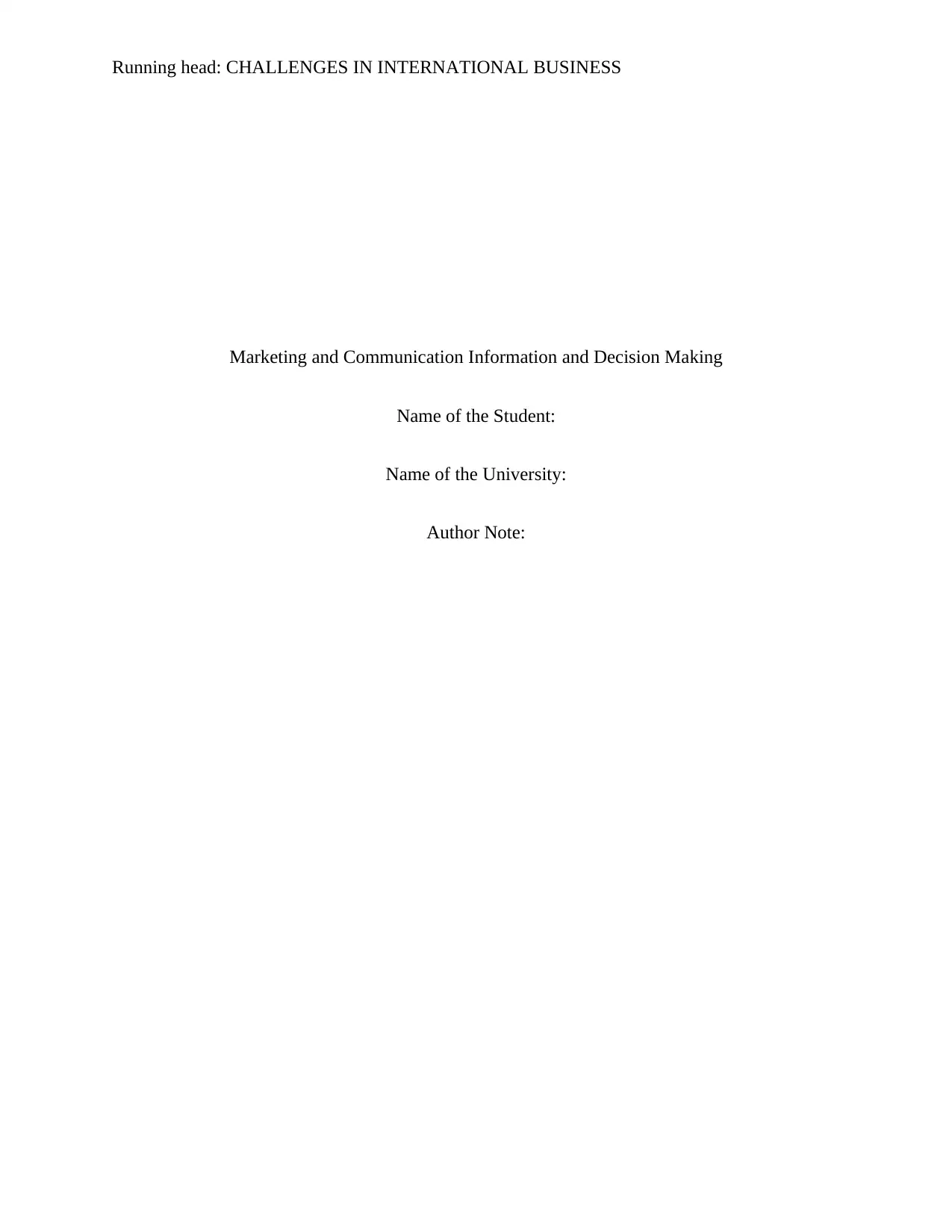
Running head: CHALLENGES IN INTERNATIONAL BUSINESS
Marketing and Communication Information and Decision Making
Name of the Student:
Name of the University:
Author Note:
Marketing and Communication Information and Decision Making
Name of the Student:
Name of the University:
Author Note:
Secure Best Marks with AI Grader
Need help grading? Try our AI Grader for instant feedback on your assignments.
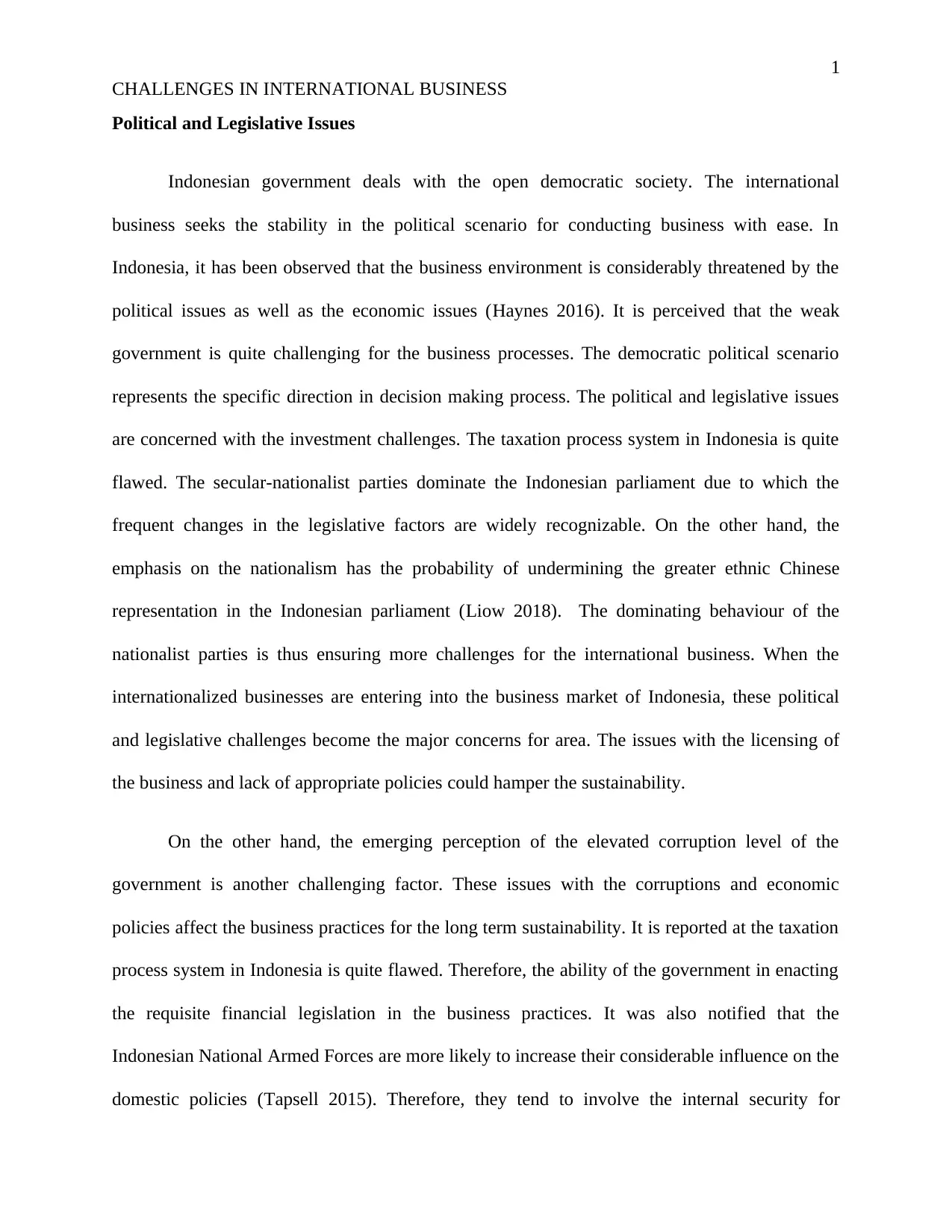
1
CHALLENGES IN INTERNATIONAL BUSINESS
Political and Legislative Issues
Indonesian government deals with the open democratic society. The international
business seeks the stability in the political scenario for conducting business with ease. In
Indonesia, it has been observed that the business environment is considerably threatened by the
political issues as well as the economic issues (Haynes 2016). It is perceived that the weak
government is quite challenging for the business processes. The democratic political scenario
represents the specific direction in decision making process. The political and legislative issues
are concerned with the investment challenges. The taxation process system in Indonesia is quite
flawed. The secular-nationalist parties dominate the Indonesian parliament due to which the
frequent changes in the legislative factors are widely recognizable. On the other hand, the
emphasis on the nationalism has the probability of undermining the greater ethnic Chinese
representation in the Indonesian parliament (Liow 2018). The dominating behaviour of the
nationalist parties is thus ensuring more challenges for the international business. When the
internationalized businesses are entering into the business market of Indonesia, these political
and legislative challenges become the major concerns for area. The issues with the licensing of
the business and lack of appropriate policies could hamper the sustainability.
On the other hand, the emerging perception of the elevated corruption level of the
government is another challenging factor. These issues with the corruptions and economic
policies affect the business practices for the long term sustainability. It is reported at the taxation
process system in Indonesia is quite flawed. Therefore, the ability of the government in enacting
the requisite financial legislation in the business practices. It was also notified that the
Indonesian National Armed Forces are more likely to increase their considerable influence on the
domestic policies (Tapsell 2015). Therefore, they tend to involve the internal security for
CHALLENGES IN INTERNATIONAL BUSINESS
Political and Legislative Issues
Indonesian government deals with the open democratic society. The international
business seeks the stability in the political scenario for conducting business with ease. In
Indonesia, it has been observed that the business environment is considerably threatened by the
political issues as well as the economic issues (Haynes 2016). It is perceived that the weak
government is quite challenging for the business processes. The democratic political scenario
represents the specific direction in decision making process. The political and legislative issues
are concerned with the investment challenges. The taxation process system in Indonesia is quite
flawed. The secular-nationalist parties dominate the Indonesian parliament due to which the
frequent changes in the legislative factors are widely recognizable. On the other hand, the
emphasis on the nationalism has the probability of undermining the greater ethnic Chinese
representation in the Indonesian parliament (Liow 2018). The dominating behaviour of the
nationalist parties is thus ensuring more challenges for the international business. When the
internationalized businesses are entering into the business market of Indonesia, these political
and legislative challenges become the major concerns for area. The issues with the licensing of
the business and lack of appropriate policies could hamper the sustainability.
On the other hand, the emerging perception of the elevated corruption level of the
government is another challenging factor. These issues with the corruptions and economic
policies affect the business practices for the long term sustainability. It is reported at the taxation
process system in Indonesia is quite flawed. Therefore, the ability of the government in enacting
the requisite financial legislation in the business practices. It was also notified that the
Indonesian National Armed Forces are more likely to increase their considerable influence on the
domestic policies (Tapsell 2015). Therefore, they tend to involve the internal security for
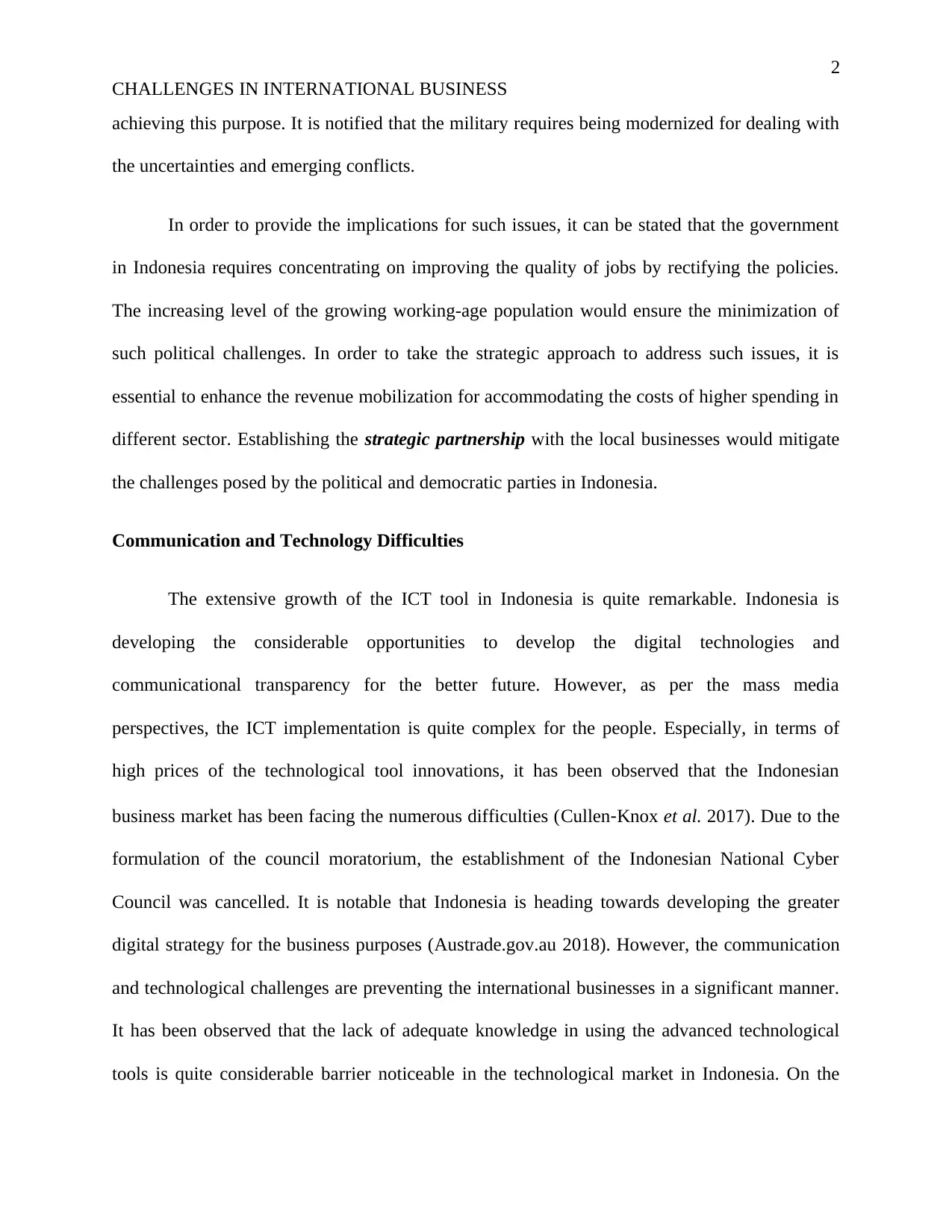
2
CHALLENGES IN INTERNATIONAL BUSINESS
achieving this purpose. It is notified that the military requires being modernized for dealing with
the uncertainties and emerging conflicts.
In order to provide the implications for such issues, it can be stated that the government
in Indonesia requires concentrating on improving the quality of jobs by rectifying the policies.
The increasing level of the growing working-age population would ensure the minimization of
such political challenges. In order to take the strategic approach to address such issues, it is
essential to enhance the revenue mobilization for accommodating the costs of higher spending in
different sector. Establishing the strategic partnership with the local businesses would mitigate
the challenges posed by the political and democratic parties in Indonesia.
Communication and Technology Difficulties
The extensive growth of the ICT tool in Indonesia is quite remarkable. Indonesia is
developing the considerable opportunities to develop the digital technologies and
communicational transparency for the better future. However, as per the mass media
perspectives, the ICT implementation is quite complex for the people. Especially, in terms of
high prices of the technological tool innovations, it has been observed that the Indonesian
business market has been facing the numerous difficulties (Cullen‐Knox et al. 2017). Due to the
formulation of the council moratorium, the establishment of the Indonesian National Cyber
Council was cancelled. It is notable that Indonesia is heading towards developing the greater
digital strategy for the business purposes (Austrade.gov.au 2018). However, the communication
and technological challenges are preventing the international businesses in a significant manner.
It has been observed that the lack of adequate knowledge in using the advanced technological
tools is quite considerable barrier noticeable in the technological market in Indonesia. On the
CHALLENGES IN INTERNATIONAL BUSINESS
achieving this purpose. It is notified that the military requires being modernized for dealing with
the uncertainties and emerging conflicts.
In order to provide the implications for such issues, it can be stated that the government
in Indonesia requires concentrating on improving the quality of jobs by rectifying the policies.
The increasing level of the growing working-age population would ensure the minimization of
such political challenges. In order to take the strategic approach to address such issues, it is
essential to enhance the revenue mobilization for accommodating the costs of higher spending in
different sector. Establishing the strategic partnership with the local businesses would mitigate
the challenges posed by the political and democratic parties in Indonesia.
Communication and Technology Difficulties
The extensive growth of the ICT tool in Indonesia is quite remarkable. Indonesia is
developing the considerable opportunities to develop the digital technologies and
communicational transparency for the better future. However, as per the mass media
perspectives, the ICT implementation is quite complex for the people. Especially, in terms of
high prices of the technological tool innovations, it has been observed that the Indonesian
business market has been facing the numerous difficulties (Cullen‐Knox et al. 2017). Due to the
formulation of the council moratorium, the establishment of the Indonesian National Cyber
Council was cancelled. It is notable that Indonesia is heading towards developing the greater
digital strategy for the business purposes (Austrade.gov.au 2018). However, the communication
and technological challenges are preventing the international businesses in a significant manner.
It has been observed that the lack of adequate knowledge in using the advanced technological
tools is quite considerable barrier noticeable in the technological market in Indonesia. On the
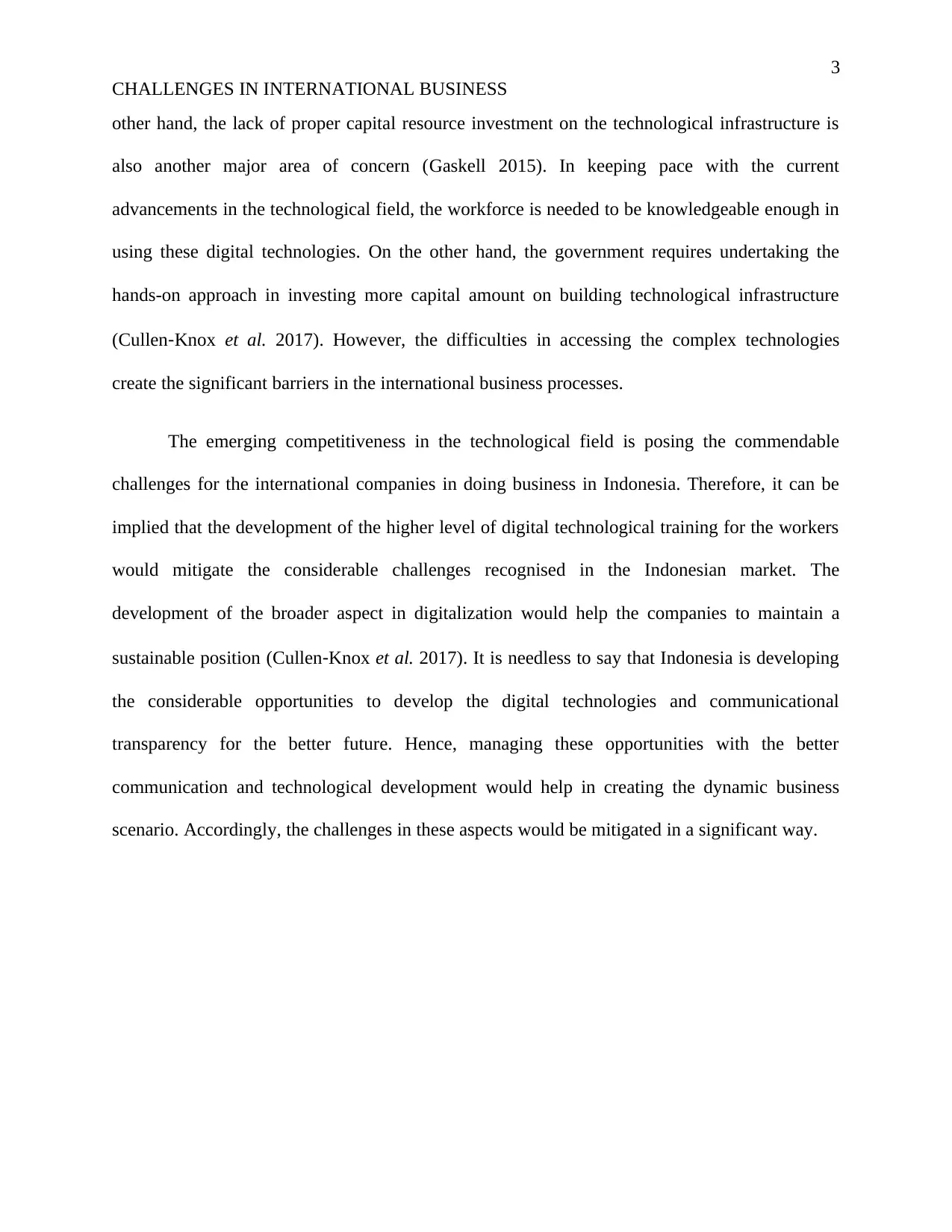
3
CHALLENGES IN INTERNATIONAL BUSINESS
other hand, the lack of proper capital resource investment on the technological infrastructure is
also another major area of concern (Gaskell 2015). In keeping pace with the current
advancements in the technological field, the workforce is needed to be knowledgeable enough in
using these digital technologies. On the other hand, the government requires undertaking the
hands-on approach in investing more capital amount on building technological infrastructure
(Cullen‐Knox et al. 2017). However, the difficulties in accessing the complex technologies
create the significant barriers in the international business processes.
The emerging competitiveness in the technological field is posing the commendable
challenges for the international companies in doing business in Indonesia. Therefore, it can be
implied that the development of the higher level of digital technological training for the workers
would mitigate the considerable challenges recognised in the Indonesian market. The
development of the broader aspect in digitalization would help the companies to maintain a
sustainable position (Cullen‐Knox et al. 2017). It is needless to say that Indonesia is developing
the considerable opportunities to develop the digital technologies and communicational
transparency for the better future. Hence, managing these opportunities with the better
communication and technological development would help in creating the dynamic business
scenario. Accordingly, the challenges in these aspects would be mitigated in a significant way.
CHALLENGES IN INTERNATIONAL BUSINESS
other hand, the lack of proper capital resource investment on the technological infrastructure is
also another major area of concern (Gaskell 2015). In keeping pace with the current
advancements in the technological field, the workforce is needed to be knowledgeable enough in
using these digital technologies. On the other hand, the government requires undertaking the
hands-on approach in investing more capital amount on building technological infrastructure
(Cullen‐Knox et al. 2017). However, the difficulties in accessing the complex technologies
create the significant barriers in the international business processes.
The emerging competitiveness in the technological field is posing the commendable
challenges for the international companies in doing business in Indonesia. Therefore, it can be
implied that the development of the higher level of digital technological training for the workers
would mitigate the considerable challenges recognised in the Indonesian market. The
development of the broader aspect in digitalization would help the companies to maintain a
sustainable position (Cullen‐Knox et al. 2017). It is needless to say that Indonesia is developing
the considerable opportunities to develop the digital technologies and communicational
transparency for the better future. Hence, managing these opportunities with the better
communication and technological development would help in creating the dynamic business
scenario. Accordingly, the challenges in these aspects would be mitigated in a significant way.
Secure Best Marks with AI Grader
Need help grading? Try our AI Grader for instant feedback on your assignments.
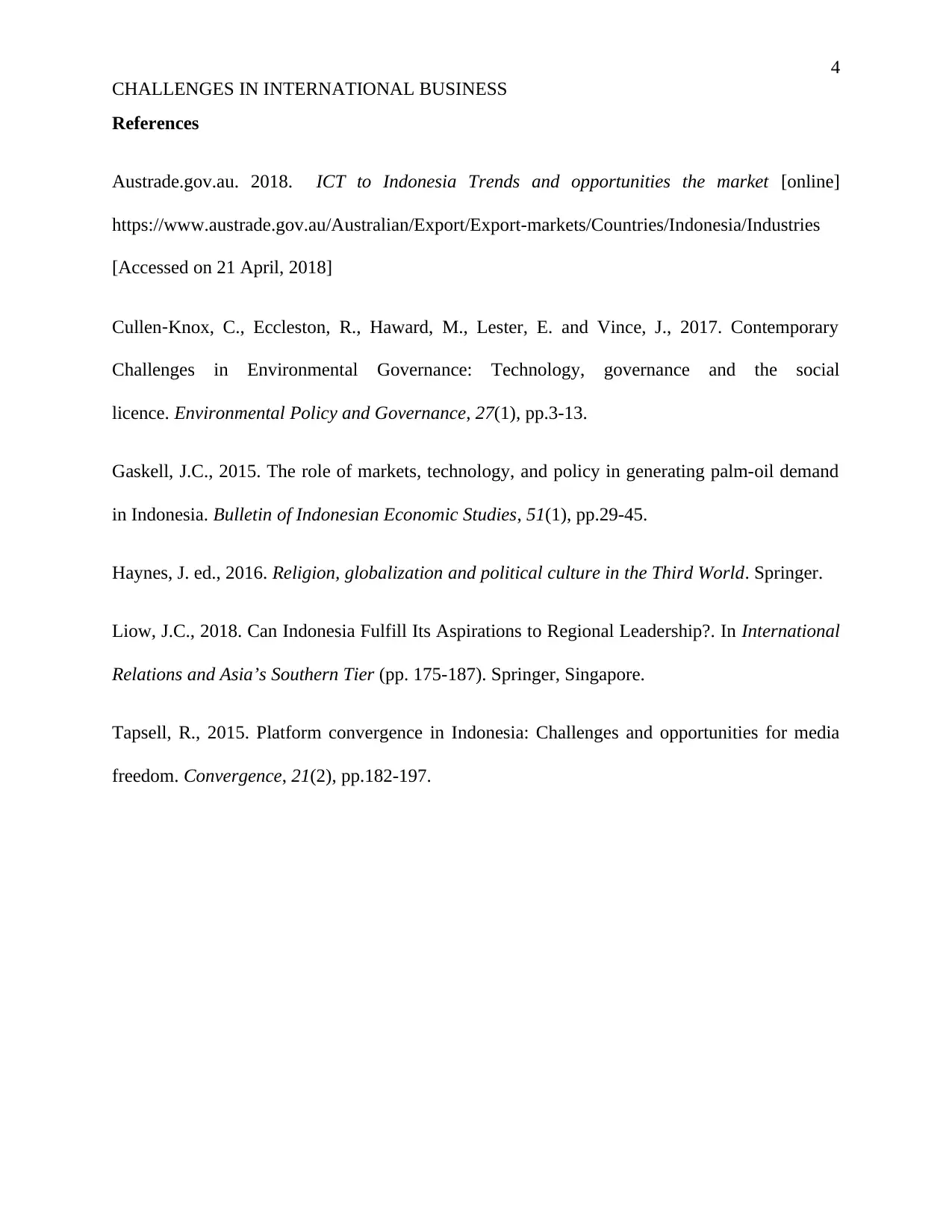
4
CHALLENGES IN INTERNATIONAL BUSINESS
References
Austrade.gov.au. 2018. ICT to Indonesia Trends and opportunities the market [online]
https://www.austrade.gov.au/Australian/Export/Export-markets/Countries/Indonesia/Industries
[Accessed on 21 April, 2018]
Cullen‐Knox, C., Eccleston, R., Haward, M., Lester, E. and Vince, J., 2017. Contemporary
Challenges in Environmental Governance: Technology, governance and the social
licence. Environmental Policy and Governance, 27(1), pp.3-13.
Gaskell, J.C., 2015. The role of markets, technology, and policy in generating palm-oil demand
in Indonesia. Bulletin of Indonesian Economic Studies, 51(1), pp.29-45.
Haynes, J. ed., 2016. Religion, globalization and political culture in the Third World. Springer.
Liow, J.C., 2018. Can Indonesia Fulfill Its Aspirations to Regional Leadership?. In International
Relations and Asia’s Southern Tier (pp. 175-187). Springer, Singapore.
Tapsell, R., 2015. Platform convergence in Indonesia: Challenges and opportunities for media
freedom. Convergence, 21(2), pp.182-197.
CHALLENGES IN INTERNATIONAL BUSINESS
References
Austrade.gov.au. 2018. ICT to Indonesia Trends and opportunities the market [online]
https://www.austrade.gov.au/Australian/Export/Export-markets/Countries/Indonesia/Industries
[Accessed on 21 April, 2018]
Cullen‐Knox, C., Eccleston, R., Haward, M., Lester, E. and Vince, J., 2017. Contemporary
Challenges in Environmental Governance: Technology, governance and the social
licence. Environmental Policy and Governance, 27(1), pp.3-13.
Gaskell, J.C., 2015. The role of markets, technology, and policy in generating palm-oil demand
in Indonesia. Bulletin of Indonesian Economic Studies, 51(1), pp.29-45.
Haynes, J. ed., 2016. Religion, globalization and political culture in the Third World. Springer.
Liow, J.C., 2018. Can Indonesia Fulfill Its Aspirations to Regional Leadership?. In International
Relations and Asia’s Southern Tier (pp. 175-187). Springer, Singapore.
Tapsell, R., 2015. Platform convergence in Indonesia: Challenges and opportunities for media
freedom. Convergence, 21(2), pp.182-197.
1 out of 5
Your All-in-One AI-Powered Toolkit for Academic Success.
+13062052269
info@desklib.com
Available 24*7 on WhatsApp / Email
![[object Object]](/_next/static/media/star-bottom.7253800d.svg)
Unlock your academic potential
© 2024 | Zucol Services PVT LTD | All rights reserved.


